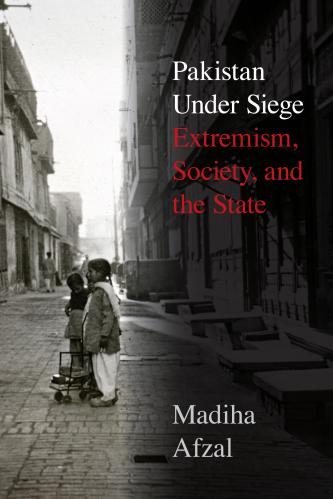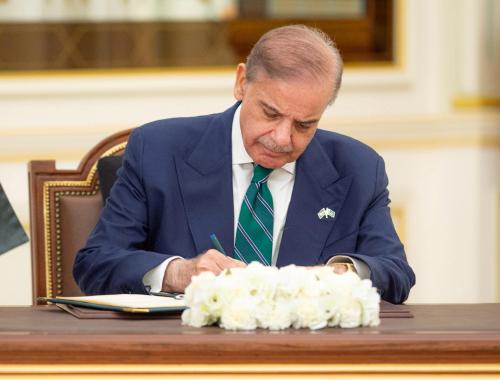As the United States intensifies its pressure on Pakistan to take action against terrorist groups, the country is facing challenges from many sides. At an event on January 16, Brookings experts delved into the issues.
The event was framed around Madiha Afzal’s new book, “Pakistan Under Siege: Extremism, Society, and the State” (Brookings Institution Press, 2018). In addition to being a nonresident fellow at Brookings, Afzal is adjunct assistant professor of global policy at the John’s Hopkins School of Advanced International Studies. Senior Fellow Bruce Riedel—who joined Brookings following a career in U.S. intelligence—joined Afzal on stage. Michael O’Hanlon, senior fellow and director of research of Foreign Policy at Brookings, moderated the event and added his own perspectives.
O’Hanlon opened the conversation by pointing to multiple concerns related to Pakistan, both within and from outside the country. He spoke about Pakistan’s role in supporting and/or condoning extremism, the threat that instability there poses to the U.S. mission in Afghanistan, and ongoing worries about the nuclear program.
He posited that there are two main puzzles: One of understanding the country, its history, and its relations with the United States; and one surrounding Pakistani attitudes toward extremism today.
Given the research that went into her book, which uses survey data, in-depth interviews, and historical analysis to convey the full picture of Pakistan’s relationship with extremism, Afzal has uncovered some compelling findings about the state of that nation today.
Afzal began with a brief history. Pakistan gained independence in 1947, and “in order to rally the Muslims [of the sub-continent], the notion of Islam in danger was often invoked,” she said. While it was not an Islamic country at birth, it became one quickly thereafter, according to Afzal.
While the country is secular in its civilian politics, Afzal pointed to two main pillars that guide it. One is nationalism derived through religion, in this case Islam. The other is nationalism driven by opposition to India, a country Pakistan has treated as an existential threat since its inception. Afzal believes that “most of Pakistan’s problems can be traced to these ideological narratives.”
O’Hanlon wondered: Is Pakistan the most troubled of its neighborhood, specifically India and Bangladesh? Afzal agreed that Pakistan has lagged, including on many key development indicators, but also pointed out that Pakistan and its economy are also doing relatively well.
A key problem, Afzal believes, is “how [Pakistan] sees itself and how the world sees it.” The country is often seen “as a villain, or a failing state.” On the flip side, she pointed to how India generally has a positive vision of itself, and Bangladesh has defined itself as a secular country, while Pakistan has “stayed in a rut that is derived from its basest instincts, a fear of India and the need to unify the new country.”
Bruce Riedel affirmed much of what Afzal had to say about Pakistan. “Pakistan is the anti-India country. It sees itself under existential threat,” Riedel said.
He also pointed out that Pakistan has been an “incredibly unlucky country.” He discussed how Pakistan’s founder was not a religious fanatic, so depicting him as the founder of a Muslim country was something of a political trick that continues to haunt the country today. The eventual ascension of military-man Muhammad Zia-ul-Haq in the late 1970s, someone who would ultimately prove pivotal for the rise of extremism in the country, was also something of an accident of history, according to Riedel.
When it comes to the U.S.-Pakistan relationship, now under renewed stress, Riedel said it “has been like a ride at an amusement park—incredible highs and lows.”
Riedel and other participants generally believed that ending U.S. aid was fairly insignificant in the longer term. However, Afzal did point out that public opinion was most favorable to the United States at a time when unconditional civilian aid was at a high: in the aftermath of the massive earthquake that hit northern Pakistan in 2005. There was also some commentary about the potential benefits of delinking military and civilian aid.
Complicated is often a key word with Pakistan, as the speakers’ remarks illuminated. Afzal said that while voices and actions of Pakistani anger are often the stories Americans see, “the story of Pakistanis’ attitudes is much more nuanced than that.”
“Ninety percent of Pakistanis denounce violence against civilians in the name of Islam. They do not buy into that,” she stated. While we tend to think of terrorism as a scourge against the West, Pakistani citizens have faced some of the worst of it, although this activity has fortunately quieted somewhat recently.
It is true that opinion in Pakistan on issues like India and the United States tends towards the negative, but Afzal pointed to fairly large swings in thought over short periods—indicating, in her view, that “these views are not immutable.”
Afzal detailed a particularly alarming set of related findings: that “younger Pakistanis have worse views on anti-Americanism, and anti-Indianism.” They are also “less negative toward terrorist groups.”
She attributes much of this to growing up in the more strictly religious education system that was instituted in the 1980s. Afzal also recalled an interview in which she was told: “the day [the United States] stops drone attacks, they [the Taliban] will stop terrorism.” This was in relation to relentless terrorist attacks across the country conducted by the Pakistan Taliban, and points to, as Afzal called it, “latent sympathy for these [terror[ groups which are considered to be one of them.”
Afzal also highlighted that many Pakistanis are simply not in the know when it comes to terrorist safe havens in the country. Events like the U.S. drone strike that killed an Afghan Taliban leader, apparently roaming free in the country, and the raid on the Osama bin Laden compound, while embarrassing for Pakistan as a nation, have also allowed citizens to see that they have not always been fed the truth.
Bruce Riedel closed out the main portion of the panel discussion by looking ahead. He noted that the “Trump administration has a policy statement on Pakistan, but no real policy.” He concluded that their policy statement is “mostly accurate, but the presentation does not help the cause, and there is not much to go with it.” This and other factors seem to favor continued troubles for the United States and Pakistan.
The Brookings Institution is committed to quality, independence, and impact.
We are supported by a diverse array of funders. In line with our values and policies, each Brookings publication represents the sole views of its author(s).





Commentary
Experts examine U.S.-Pakistan relations and the extremism problem
January 25, 2018